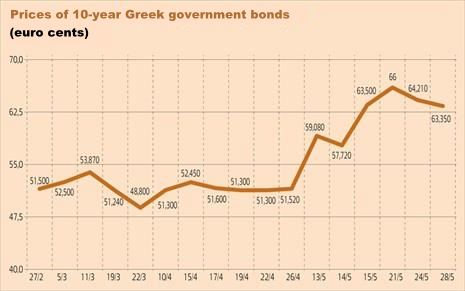Photo: naftemporiki.gr
The profit on Greek government bonds has increased by 31% over the past three months whereas, in the meantime, the price of German government bonds has dropped by 0.5%. Since the beginning of April, the price of Greek bonds has increased by 40 basis points. This is the best market performance of the government bonds of 26 countries observed by Bloomberg. Following Greek bonds, Italian government bonds with a 4.4% increase in the price are also the most profitable in the market.
Greek government bonds have revived the investor interest in the secondary online market, which is indicated by the increased volume of trade. Since the beginning of May, the online trade of Greek bonds has exceeded 318 million euro, which is a peak in comparison with the last two years as reported by ANA-MPA, which gives the example of the total volume of online trade of Greek bonds that did not surpass 70 million euro in April.

Despite the positive changes, the trade of Greek government bonds is far from its strongest days. Naftemporiki reports that in comparison, the average trading volume of this type of securities, whose price collapsed in October 2011, was about 136 billion euro a month in 2004. Earlier this week, the spread indicator that represents the difference between the price of Greek and German 10-year government bonds reached 708 basis points. It reflects a significant improvement in investor confidence in Greece and its potential for economic recovery.
Just a day after Fitch upgraded Greece's credit rating to B- from CCC, the average monthly yield on 10-year government bonds fell by 53 basis points. The market returned to normal on 21 May. The credit rating agency based its decision on the political and social stability that has been established in the country as well as on the progress in the recovery programme. Financial analysts have determined that the risk of Greece leaving the euro zone is significantly lower (almost zero) compared with its condition last year.
Meanwhile, improvements in other macroeconomic indicators have been observed as well. Makrit agency reports that the indicator on the status of the processing industry has improved. In April, its level was 42 points whereas it reached 45 points in May. In addition to production, bank recapitalization also contributes to restoring the investment interest in government bonds. Their strengthened positions support the recovery of economic stability and positively affect the price of the bonds, which were sold on the cheap (14% -20% of their nominal value) during the political crisis in the summer of 2012.
Although the greatest risks have been surmounted, Bloomberg reports that Greek bonds will begin to bring real profit next year if the economic growth exceeds 2% and if the GDP exceeds 210 billion euro. By 2021, the volume of the Greek economy should exceed 267 billion euro and the economic growth should remain above 2% in order for the country to be able to obtain funds from the open market at lower interest rates. However, the forecasts are not very optimistic. The European Commission predicts that this year's recession will continue and the economy will shrink by another -4.6% and in the best case scenario, growth of 0.6% can be expected in 2014. This is far below the levels needed to allow Greek bonds to recover.
Another obstacle that must be overcome in order for the government bond market to return to normal is the stabilization of the debt. Citigroup provides that at the end of 2013, the external debt of the country will again reach 180% of GDP, making it highly unstable. According to financial experts, Athens and Brussels will trigger a new debt haircut at the end of this year or early next year, which, this time, will affect institutional investors (the central banks of European Union countries).
The progress in achieving the fiscal targets under the programme for financial recovery and the closer cooperation of the present government with the supervisors will make the lenders more easily accept the possible haircut of the debt held by the official sector (Official Sector Involvement - OSI), according to Citygroup.
Deutsche Bank, in turn, points out that over the past two years Greece has lost much of its direct private investment, which prevents more rapid recovery. The trend of stabilization of investment is positive today unlike the steady decrease reported until recently. According to the data provided by the German bank, private financing to Greece fell by 100 billion euro from early 2011 to the middle of 2012. Since the beginning of the year, the country has been able to recover only about 10% of the lost cash flow streams. Unfortunately, this improvement is not the result of the return of foreign investors to the country but of the partial return of Greek capital from abroad.